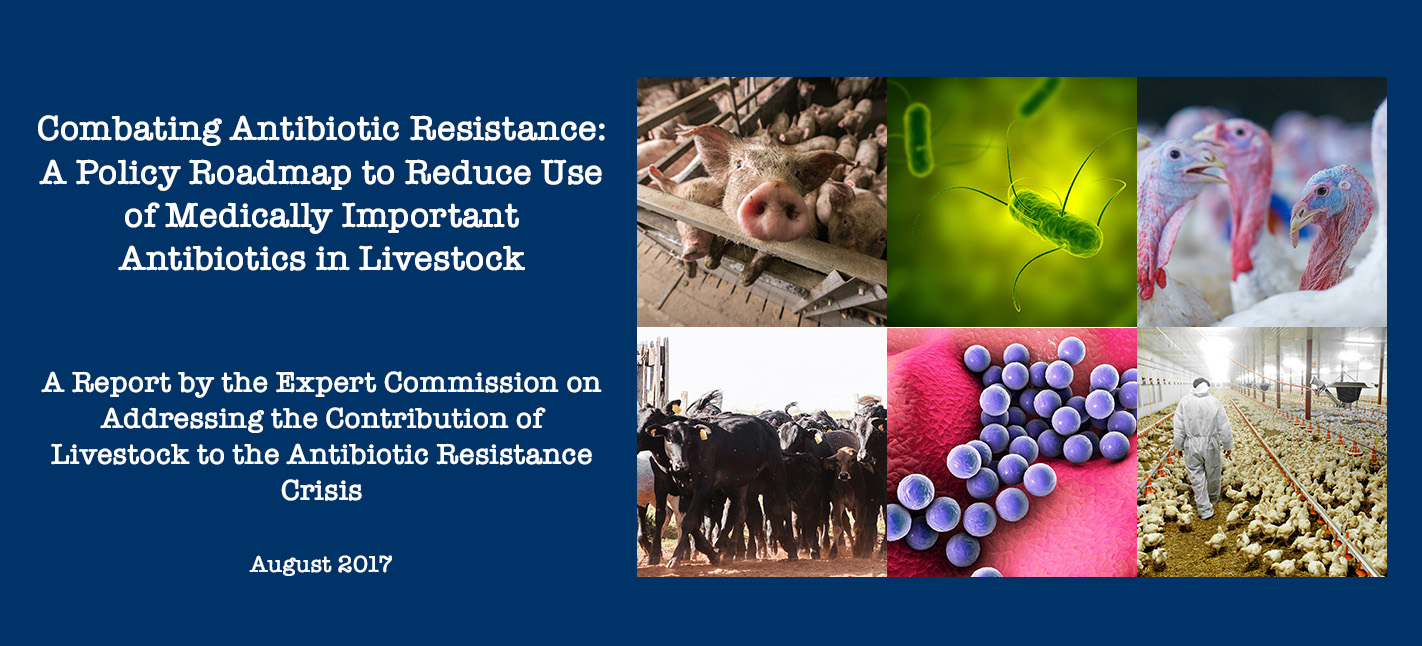Leading physicians, veterinarians and other experts outline key steps for policymakers, food companies and food purchasers, and medical groups to help tackle the antibiotic resistance crisis.
WASHINGTON, DC (August 29, 2017) — Antibiotic resistance is a public health crisis that threatens the lives of millions of people around the world. Yet, according to a new report released today, the U.S. policy response fails to adequately address this major challenge. The commission report was authored by 12 antibiotic resistance experts from the fields of infectious disease medicine, veterinary medicine, microbiology, epidemiology and public health, including Co-Chair Lance Price, Director of the Antibiotic Resistance Action Center, which is based at George Washington University's Milken Institute School of Public Health (SPH).
The report, Combating Antibiotic Resistance: A Policy Roadmap to Reduce Use of Medically Important Antibiotics in Livestock, is the result of an eight-month collaboration by commission experts to craft a roadmap, consisting of 11 core policy recommendations, to help move the U.S. forward in addressing the contribution of livestock antibiotic use to the growing global threat of antibiotic resistance. The recommendations are aimed at a broad set of stakeholders: federal, state and local policymakers, food companies, institutional food purchasers (i.e. hospitals, schools and universities), and medical groups.
Without more urgent action, the World Health Organization, United Nations, and the Centers for Disease Control and Prevention agree we may soon be living in a world where antibiotics are ineffective against many bacterial infections. Leaders from the top medical and public health organizations agree that more prudent use of antibiotics in human medicine and in livestock production is paramount. Of particular concern is the widespread use of antibiotics important to human medicine in food animals; such use accounts for 70% of all sales of medically important antibiotics in the U.S.
“Until we become better stewards of antibiotics, both in human medicine and in livestock production, these life-saving drugs will continue to become less effective, and the effectiveness of any future antibiotics will be at constant risk,” said Jason Newland, MD, who co-chaired the Commission and is a pediatric infectious diseases physician at Washington University in St. Louis and the Director of the Antimicrobial Stewardship Program at St. Louis Children’s Hospital.
The policy roadmap outlines 11 recommendations on how U.S. policy can and should better address antibiotic use in food animal production and its contribution to antibiotic resistance. The recommendations are split into three key areas: decreasing livestock use of medically important antibiotics, monitoring livestock antibiotic use, and enhancing surveillance and data integration to inform antibiotic resistance policy.
“Some positive policies have been implemented to curb inappropriate antibiotic use in U.S. food animal production, but they’ve been too slow and fall far short of what is needed” said co-chair Price, who also is a professor of environmental and occupational at the Milken Institute SPH. “Antibiotic resistance is one of the greatest health threats of our time. It’s time for more concrete, comprehensive action from policymakers, food companies, large food buyers, and medical groups. We urgently need these policies to protect the public.”
The full report, executive summary (including recommendations), and appendices can be accessed on our Policy Roadmap.
***
The expert commission was composed of 12 infectious diseases physicians, veterinarians, epidemiologists, microbiologists, pediatricians and led by co-chairs Drs. Lance Price and Jason Newland. Other members included: Aparna Bole, MD, FAAP, Medical Director, Community Integration UH Rainbow Babies & Children's Hospital; Valeria Bortolaia, DVM, PhD, Senior Researcher, Research Group for Genomic Epidemiology Technical University of Denmark; Jesper Larsen, DVM, PhD, Researcher, Department of Bacteria, Parasites and Fungi, Statens Serum Institut, Denmark; Guy H. Loneragan, BVSc, PhD, Professor, Food Safety and Public Health, Texas Tech University; Steven Roach, MA, Food Safety Program Director, Food Animal Concerns Trust; Tara C. Smith, PhD, Associate Professor in Epidemiology, College of Public Health, Kent State University; Anthony D. So, MD, MPA, Professor of the Practice, Director, IDEA (Innovation + Design Enabling Access) Initiative and Strategic Policy Program, ReAct‒Action on Antibiotic Resistance, Department of International Health, Johns Hopkins Bloomberg School of Public Health; Linda Tollefson, DVM, MPH, Rear Admiral, U.S. Public Health Service (Ret); Jaap Wagenaar, DVM, PhD, Professor Clinical Infectiology, Faculty of Veterinary Medicine, Utrecht University, the Netherlands and Wageningen Bioveterinary Research, Lelystad, the Netherlands; Theoklis Zaoutis, MD, MSCE, Professor of Pediatrics and Epidemiology, Perelman School of Medicine, University of Pennsylvania; Chief, Division of Infectious Diseases, Children’s Hospital of Philadelphia.
The Commission convened at the George Washington University Milken Institute School of Public Health (GWSPH) in November 2016. The Commission’s efforts have been supported by staff members at the Antibiotic Resistance Action Center at GWSPH and the Natural Resources Defense Council.


